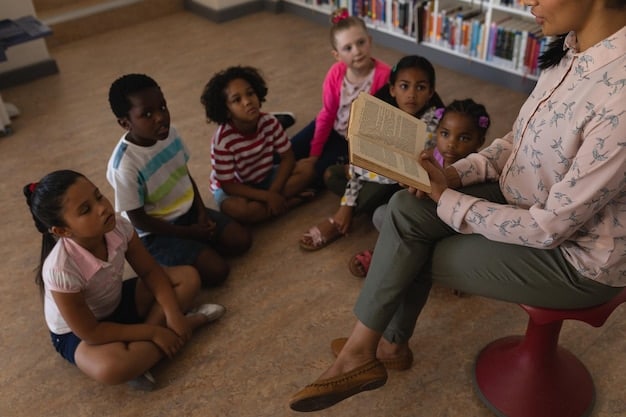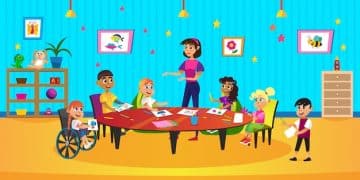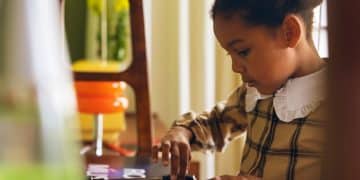Preparing Your Child for Kindergarten: A Guide for US Parents

How to prepare your child for kindergarten involves fostering academic, social, and emotional readiness through engaging activities, establishing routines, and open communication, ensuring a smooth transition for both the child and parents in the US.
Embarking on the kindergarten journey is a significant milestone for both children and their parents. Understanding how to prepare your child for kindergarten is essential to ensure a smooth and successful transition. This guide offers comprehensive insights tailored for US parents.
Understand Kindergarten Readiness
Kindergarten readiness is more than just knowing ABCs and 123s. It encompasses a range of skills and attributes that help children thrive in a classroom environment. Understanding these key areas will guide your preparation efforts.
Academic Skills
While mastery isn’t expected, exposure to basic academic concepts is beneficial. This includes recognizing letters, numbers, shapes, and colors. Simple pre-reading and pre-writing activities can also be helpful.
Focus on making learning fun and engaging. Avoid pushing your child too hard, as this can create unnecessary stress.
Social and Emotional Skills
These skills are just as important as academic abilities. Kindergarteners need to be able to share, take turns, follow directions, and manage their emotions. Social and emotional intelligence lays the foundation for positive interactions with peers and teachers.
- Sharing and Cooperation: Encourage sharing toys and working together on simple tasks or games.
- Following Directions: Practice giving your child simple instructions to follow, increasing complexity gradually.
- Emotion Management: Help your child identify and express their feelings in a healthy way.

Physical Development
Fine motor skills, such as holding a pencil and using scissors, are important for kindergarten. Gross motor skills, like running and jumping, are also essential for active participation in classroom activities.
Provide opportunities for your child to practice these skills through play and everyday activities. Building strength and coordination builds confidence too.
Kindergarten readiness is a holistic concept, encompassing academic, social, emotional, and physical development. A balanced approach that nurtures these areas will set your child up for success.
Foster Academic Skills Through Play
Learning doesn’t have to be a chore. Engaging in playful activities is a great way to foster essential academic skills without your child even realizing they’re learning.
Reading Aloud
Reading aloud to your child is one of the most effective ways to promote literacy. It exposes them to new vocabulary, expands their imagination, and cultivates a love of reading.
Choose books with engaging stories and colorful illustrations. Make it an interactive experience by asking questions about the characters and plot.
Hands-On Math Activities
Incorporate math into everyday activities. Count objects, sort toys, and measure ingredients while baking. These hands-on experiences make math concepts more concrete and relatable.
- Counting Games: Use toys or household items to practice counting.
- Shape Sorting: Sort objects by shape to reinforce geometric concepts.
- Measurement Activities: Use measuring cups and spoons to explore volume and capacity.
Creative Writing and Drawing
Encourage your child to express themselves through drawing and writing. Provide them with plenty of art supplies and allow them to create freely. Inventing stories through drawings stimulates creativity.
Even simple scribbles and marks can be a form of pre-writing. Praise their efforts and encourage them to keep exploring.
Fostering academic skills through play is a fun and effective way to prepare your child for kindergarten. Embrace opportunities to make learning enjoyable and engaging.
Develop Social and Emotional Intelligence
Navigating social situations and managing emotions are crucial skills for kindergarten success. Focus on activities that promote empathy, communication, and self-regulation.
Role-Playing and Imaginative Play
Engage in role-playing scenarios that mimic real-life situations, such as sharing toys or resolving conflicts. This allows children to practice social skills in a safe and supportive environment.
Acting out different roles helps develop emotional intelligence and teaches effective communication skills.
Cooperative Games and Activities
Choose games that require teamwork and cooperation. These activities teach children how to work together, share responsibilities, and compromise.
- Building Projects: Construct a tower or fort together, assigning different roles.
- Board Games: Play board games that require taking turns and following rules.
- Group Art Projects: Create a collaborative painting or collage.
Emotion Identification and Expression
Help your child identify and express their emotions in a healthy way. Use picture books or flashcards to illustrate different feelings. Open communication about difficult situations helps foster resilience.
Teach them coping strategies for managing anger, sadness, and anxiety. Practice deep breathing or counting to calm down.
Developing social and emotional intelligence is essential for kindergarten readiness. Support your child’s emotional growth through purposeful activities and open communication.
Establish a Consistent Routine
A predictable routine provides children with a sense of security and stability. Establish a consistent daily schedule that includes set times for meals, playtime, and bedtime.
Morning Routine
Create a simple and structured morning routine. This could include getting dressed, eating breakfast, brushing teeth, and packing a backpack. Practice the routine in the weeks leading up to kindergarten.
Visual schedules can be helpful for children who need extra support. Use pictures or symbols to represent each step in the routine.
Afternoon Routine
Establish a consistent afternoon routine that includes time for homework, playtime, and relaxation. Make sure to build in opportunities for unstructured play and outdoor activities.

Limit screen time in the hours before bedtime. This can interfere with sleep and make it harder for children to wind down.
Bedtime Routine
A consistent bedtime routine is crucial for promoting healthy sleep habits. This might include a warm bath, reading a story, and singing a lullaby. Avoid screen time before bed.
Stick to the same bedtime and wake-up time, even on weekends. This will help regulate your child’s internal clock.
Establishing a consistent routine provides children with a sense of predictability and control. This can reduce anxiety and promote a smooth transition to kindergarten.
Visit the School and Meet the Teacher
Familiarizing your child with the school environment can alleviate anxiety and build excitement. Arrange a visit to the school before the first day of kindergarten.
Attend Orientation Events
Take advantage of any orientation events or open houses offered by the school. These events provide an opportunity to meet the teacher, explore the classroom, and learn about school policies.
This is also a good time to ask questions and address any concerns.
Arrange Playdates with Future Classmates
If possible, arrange playdates with other children who will be attending the same kindergarten class. This can help your child form friendships and feel more comfortable on the first day.
Contact the school or other parents to coordinate playdates.
Talk Positively About the School Experience
Speak positively about school and the opportunities it offers. Share your own positive memories of kindergarten. Building positive impressions of kindergarten builds excitement and motivation.
Avoid sharing any negative experiences or anxieties you may have about school.
Visiting the school and meeting the teacher can significantly reduce anxiety and promote a positive transition to kindergarten. Create opportunities for familiarization and connection.
Practice Independence and Self-Care Skills
Kindergarteners need to be able to manage basic self-care tasks independently. Practice these skills at home to build confidence and self-sufficiency.
Dressing and Undressing
Teach your child how to dress and undress themselves. This includes buttoning, zipping, and tying shoes. Choose clothes that are easy for them to manage.
Practice these skills daily to build muscle memory and coordination.
Using the Restroom
Ensure that your child is comfortable using the restroom independently. Teach them proper hygiene practices, such as washing their hands thoroughly.
- Handwashing: Practice washing hands with soap and water for at least 20 seconds.
- Bathroom Etiquette: Explain the importance of privacy and cleanliness.
- Accidents: Discuss what to do if an accident occurs at school.
Eating Lunch
Practice opening lunch containers and packaging independently. Pack a lunch that your child can easily manage. Encourage them to try new foods at home, so that lunch is exciting.
Teach them basic table manners, such as using utensils appropriately and cleaning up after themselves.
Practicing independence and self-care skills empowers children and builds confidence. Foster these skills at home to prepare them for the demands of the kindergarten classroom.
| Key Point | Brief Description |
|---|---|
| 📚 Academic Skills | Practice letters, numbers, shapes and colors through fun activities. |
| 🤝 Social-Emotional Skills | Encourage sharing, taking turns, and managing emotions effectively. |
| ⏰ Consistent Routine | Establish a predictable daily schedule for meals, play, and bedtime. |
| 🎒 Independence | Practice self-care skills like dressing, restroom use, and eating lunch independently. |
Frequently Asked Questions
▼
In most US states, children must be 5 years old on or before a specific date (often September 1st) to enroll in kindergarten. Check your state’s specific age requirements to make sure your child is eligible to enroll.
▼
Practice separation gradually by leaving your child with trusted caregivers for short periods. Talk positively about school, and reassure them that you will always return. Create a special goodbye ritual.
▼
Knowing basic literacy and numeracy skills, like letter and number recognition, is helpful. Focus on social skills like sharing and following directions and personal care skills like dressing and using the restroom independently.
▼
Typical supplies include a backpack, lunchbox, pencils, crayons, glue sticks, and a change of clothes. Check with your school for a specific supply list. Involve your child in choosing these items.
▼
Read with your child regularly, practice basic math skills, provide opportunities for creative expression, and create a supportive learning environment. Communicate openly with your child’s teacher and participate in school events.
Conclusion
Preparing your child for kindergarten is a rewarding journey. By focusing on academic, social, and emotional readiness, establishing routines, and fostering independence, you can help your child embark on this new adventure with confidence and enthusiasm.





